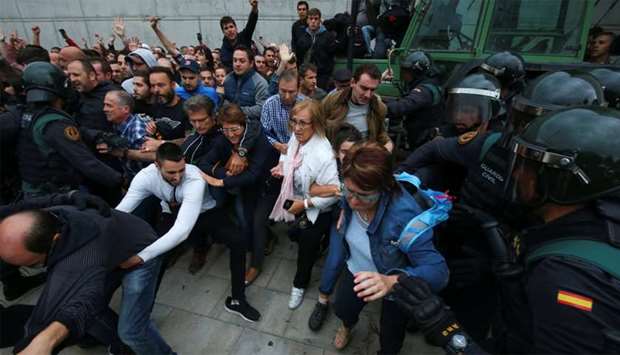Spanish police have responded with ‘unjustified and unjustifiable’ brutality, even with rubber bullets, to Catalonia's unauthorized independence referendum, the region's secessionist leader said Sunday.
Carles Puigdemont spoke after riot-gear officers stormed schools and other public buildings designated as polling stations. Catalans had occupied them in the past 72 hours in attempt to keep them open for voting.
Police responded to ‘ballot boxes, ballot papers and schools’ with ‘batons and rubber bullets,’ Puigdemont charged in a press conference. Such ‘police brutality will forever shame the Spanish state,’ he added.
Social media was filled with images of officers in tense stand-offs with crowds. Some people could be seen dragged away by officers wearing helmets and carrying batons; others were injured and were carried out of schools in stretchers.
Catalan regional health authorities wrote on Twitter that 38 people were injured following ‘Spanish police charges,’ including nine who were hospitalized. Most of the others were treated for ‘bruises, dizziness and panic attacks.’
The Spanish government said it was necessary to enforce the rule of law and stop a vote banned by the Constitutional Court. ‘We were forced to do what we did not wish to do,’ the Madrid government delegate for Catalonia, Enric Millo, said.
‘Officers seize ballot boxes and papers in several schools in Barcelona. We are applying the law,’ the National Police said on Twitter, in a message retweeted by the Spanish Interior Ministry.
Puigdemont was forced to change his voting plans after his regular voting station in Sant Julia de Ramis was shut down by police. Instead, he cast his ballot in nearby Cornella del Terri, some 110 kilometres north-east of Barcelona.
‘They cannot silence the voice of the people. We will vote and we will win,’ pro-independence campaigner Jordi Sanchez, leader of the Catalan National Assembly, wrote on Twitter, next to a picture of Puidgemont voting.
Catalan authorities planned more than 2,300 polling stations for some 5.3 million eligible voters. They are due to to stay open to 8 pm (1800 GMT). A spokesman said 73 per cent of voting sites were operational despite the police action.
Just before voting started, Catalans were told they could cast their ballots at any open polling station they could find, as regional authorities tried to find ways to circumvent anti-referendum measures.
Before Sunday's raids, Spanish and Catalan police seized at least 12 million ballot papers, arrested 14 officials involved with referendum planning, closed down hundreds of election websites and seized the hall where votes were due to be counted.
The online software that Catalans were using to identify voters has been taken down by Spanish police, so now voting registration is being done manually.
Catalonia has 7.5 million inhabitants and, accounting for roughly 20 per cent of Spain's economic output, it is one of its wealthiest regions. It has a separate language, Catalan, a history of oppression from Madrid, and grievances about subsidizing the rest of Spain.
According to opinion polls, there is no majority support for independence among Catalans, but the 'yes' vote is widely expected to prevail Sunday as unionists have been urged to boycott the referendum.
Turnout is seen as critical: a high number would allow secessionists to claim they have a mandate for independence; a low one could seriously undermine their attempts to be taken seriously. But there are doubts that participation rates can be measured reliably.
It is Catalonia's second independence referendum in three years. More than 80 per cent voted in favour in a non-binding poll in 2014, but less than half of the eligible voters turned out.

